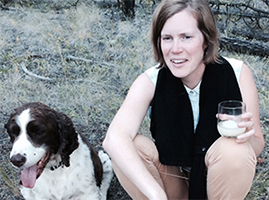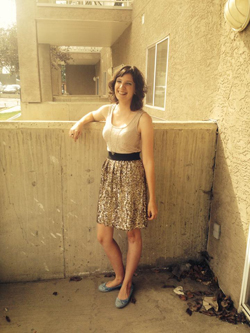The Wise Eye of the Moon: Rose Morris
in Conversation with Kate Kennedy

Malahat volunteer Rose Morris talks with Kate Kennedy about perfectionism, physical fixedness, and perspective in her poem "Parallax," set to appear in Issue #200.
The Malahat Review's upcoming Issue #200 is our fiftieth anniversary issue. It features Victoria writers past, present, and future. Be sure to check out the Issue #200 page for a complete list of contributors.
In addition to being a poet, you are a professional editor. Do you find it difficult to edit your own work?
At the risk of sounding like that person at the job interview who says their weakness is perfectionism, being an editor might have made me a little too ready to edit my own work. I sometimes plunge into the revisions before I’ve let the poem cool off, only to come all the way around to preferring the first incarnation of certain lines over my tinkered version. But I suppose that’s not the worst way to come to a decision. At the same time, I’m absolutely not a believer in the whole “first word, best word” idea. I’ve had poems go through pretty extensive revisions before I got them to where they could go into the world by themselves. I definitely benefit from an outside editorial eye, particularly in pointing to places where I’ve accidentally elided the meaning in my attempt to create a smoother surface sound-wise. I don’t do a lot of looking back at old versions of poems I’ve published, but when I do I’m always amazed at how obvious I sometimes thought I was being when I’d just sailed right over what I was actually trying to put down on the page.
Do you ever find inspiration in the works that you edit professionally?
Of course. I don’t edit much poetry these days, but I edited quite a lot of it in my first five or six years as an editor and had what still seems like the dumb luck of working with some very accomplished poets when I was probably too young to be taken all that seriously in my attempts. They were mostly quite polite about it, though. I think editing in general, regardless of genre, gives me the opportunity to read something much more slowly than I do when I’m reading after-hours. You can hypothetically take a line or sentence apart and see if a slight shift would work better and then put it back together and on the way learn a bit about the decisions the author was making when writing. That’s been incredibly useful to me as a writer.
Your poem “Parallax” is set to appear in The Malahat Review’s “Victoria Past, Present, Future” issue. Why do you think it is important to have an issue about Victoria?
I think it’s important occasionally in the current scheme of things seeming to come out of no-place to highlight where a journal is coming from. When I first moved here and had a little bit more free time, I did some volunteering for the journal and visited the office one day, and although I’m sure the regular staff don’t find it a particularly magical office, it was really great to me to see where people sat and the little shelf of books for review and to go out in the hallway with another volunteer and proofread aloud the pages of the upcoming issue. Things start in physical space and although I don’t know as much as I should about the writing culture in Victoria at the time when the Malahat was founded, I think having a city-based issue is a way to kind of honour that continuum of place.
What does it mean to you to be included in this particular issue?
Well, I don’t know if the Malahat knows this but it’s among two or three of the top picks for people in Canada sending work out to journals. It was the first place I sent work to, and although it took a few more years to place a poem here, it meant a lot when it happened. It means a lot to be in any issue of the Malahat but to be in this issue feels like being part of a community I theoretically know exists but that I don’t do enough to encounter in real life. I’m terrible at introducing myself to people at literary events, even after I’ve got myself there for the purpose of maybe meeting other writers, so to be able to do this on paper is quite ideal. I’m excited to see who else is going to be in there.
You’ve lived in both Victoria and the Maritimes. Would you say you are more of a West-Coast or East-Coast writer? Is there a difference?
That’s a toughy at the moment. I think probably still both at this point, if we’re talking about just sense of belonging. I’m from the Interior of BC but have only spent the last couple of my adult years back in the province so I think the East Coast will be hard to shake, should I want to. In terms of style, there might be people who have been watching both sides for longer, edited anthologies and things like that, and have more definitive views on whether there is such a thing as a notable East Coast or West Coast style to speak of. For me, while the communities are distinct, it seems like the range of work coming out of both coasts is comparable.
“Parallax” revolves around the movement of the speaker in relation to the stillness of the moon. Can you talk a bit about movement and stillness in regards to place (either specifically in that poem or in your work in general)?
Hmm. I think that even though I’ve done a decent amount of travelling in my life, I’ll always be a bit of a hick (or maybe I mean a kid) in how weird it still feels that other places continue on even though I can’t actively keep my eye on them most of the time. I sometimes stop in the middle of my day and think along the lines of “Whoa, people are walking around in China right now.” Or “How weird is it that my friend so-and-so is sleeping in his bed in Ireland right now? Not just theoretically, but actually in his bed.” I’m one of those annoying people who blather on about how this time yesterday or last week we were on a whole other continent. And Fountain Flat, where the poem is set, is a place that for whatever childhood-developmental reason has always felt like a fixed, still location to me. The moon, like it is for I think a lot of people, is this kind of wise eye in my life if I’m doubting my current situation or looking for a sense of an outside perspective. It’s a fixed object, but one that has a physical fixedness that is also an illusion, and the way that has re-presented itself to me over the years is something I find quite interesting. But then I also can’t get over the fact that the whole rest of the world isn’t just in my imagination.
I read in the bio on your website that you did Classical Studies in university. Has that influenced your writing?
If anything it might have made me more leery of including Classical references in my work. I think I’ve mostly shied away from actively bringing it into my poetry, dropping Achilles or Clytemnestra or whoever in there to let readers know I went to university. Having said that (and it may come to nothing), I’m working on some poems right now, set on the same stretch of plateau that “Parallax” is, that try to do something that’s partly inspired by ancient stage design. I studied mainly Classical drama and although I think it would be maybe not especially important for a reader to pick out definitively, what’s stuck of that, even when most of the details of the plays themselves have disappeared from my memory, is the starkness of the scenes (a character leaning against a rock and that’s about the extent of it) as well as the importance of the surrounding landscape in Greek theatres. Probably I’ve just jinxed it.
* * * * * * * *










